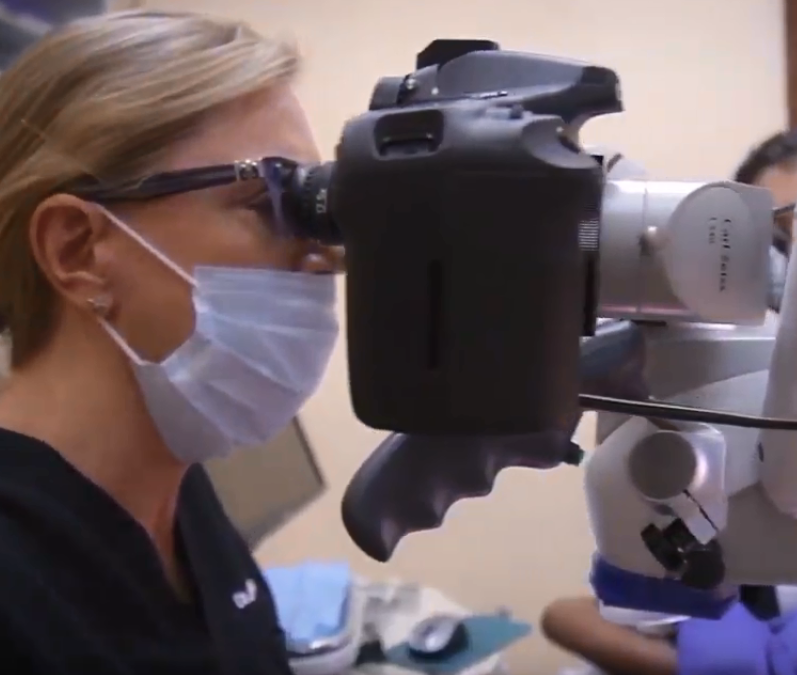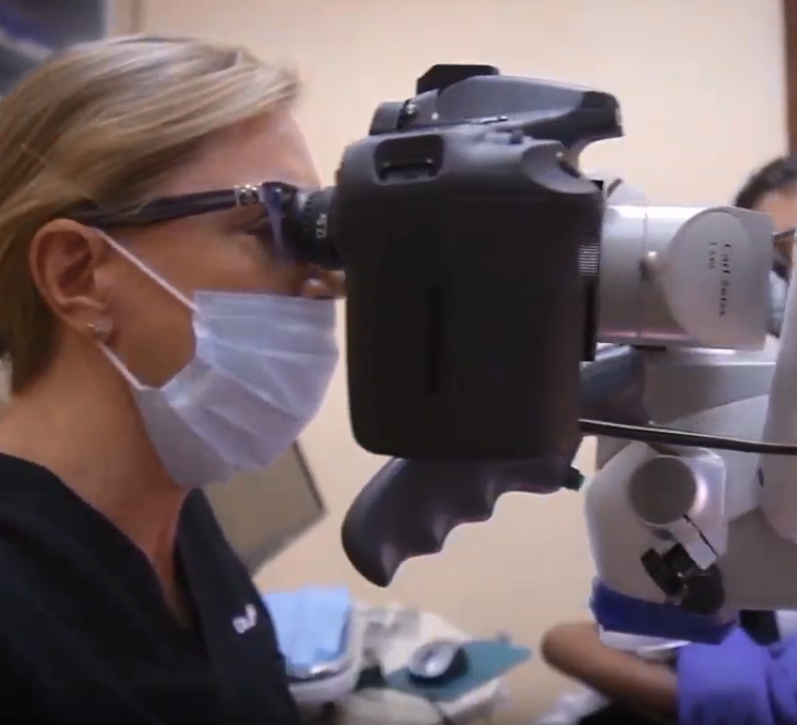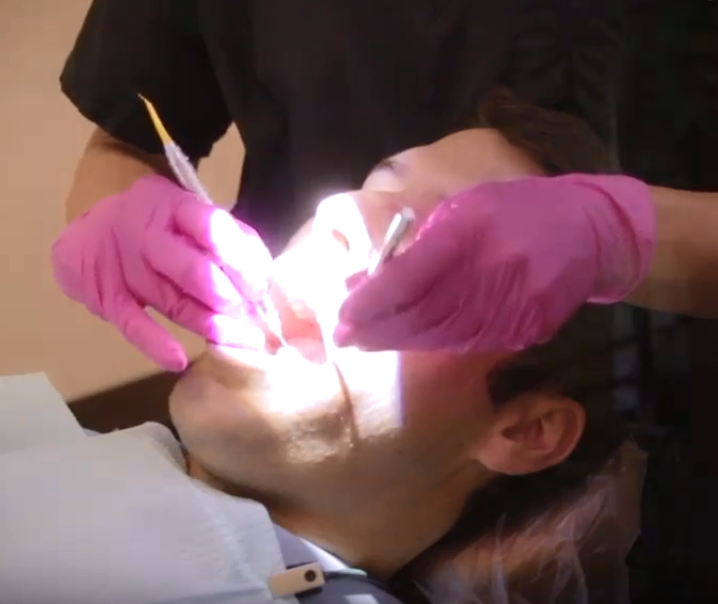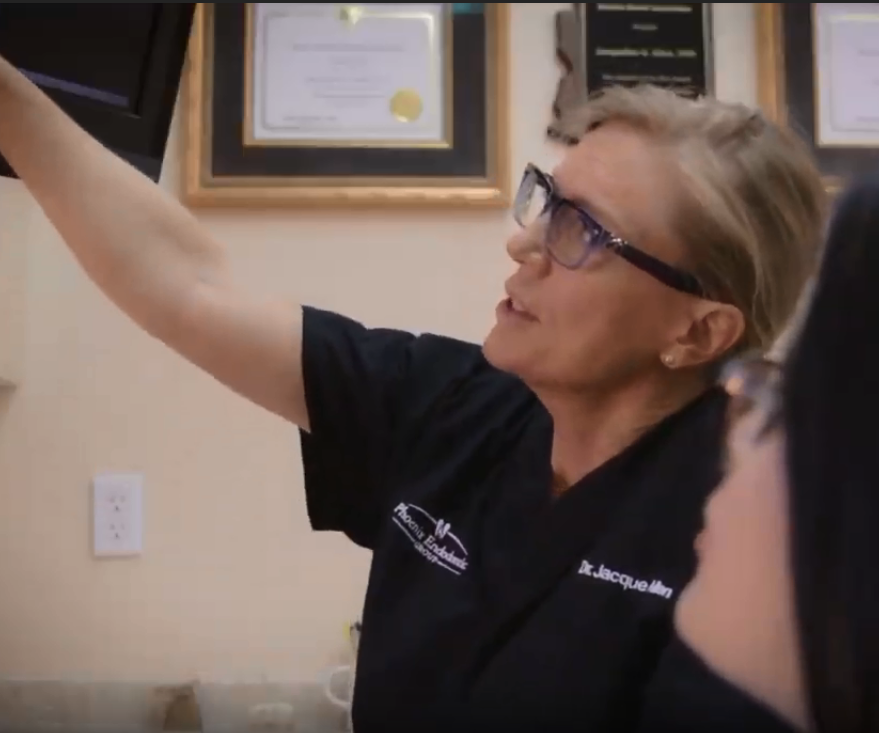
by Dr. Jacqueline S. Allen | Jul 20, 2020 | Blog, Dental Implants, Endodontist, Phoenix Endodontic Group
For those struggling with problems with natural teeth, one question can become paramount: “Should I have an endodontist treat my tooth with a root canal, or should I consider getting a dental implant?”

The decision-making process related to a dental implant involves many factors. However, there are numerous situations in which a dental implant is clearly a strong choice to rectify your dental challenges, some of which are discussed below.
Situations That Support Choosing A Dental Implant
- Earlier attempts to save your natural tooth have been unsuccessful. If your natural tooth continues to have serious infection issues after a root canal or a root canal retreatment, it may be time to consider an implant.
- You have had gum disease around the impacted tooth/teeth. The declining health of your gums can damage your periodontal ligament, which plays a crucial role in attaching the roots of your tooth to your jaw. If the ligament cannot regenerate itself successfully, it becomes much harder to retain a natural tooth.
- You are not a strong candidate for a fixed bridge or a partial set of dentures. If you are struggling with one or several teeth adjacent to each other, it might seem more cost-effective to try a fixed bridge or partial dentures. However, not everyone can tolerate the feel of dentures and the care they require, and the alterations required for a fixed bridge require the adjacent teeth to be structurally sound.
- Your natural tooth is already gone. If you have already lost your tooth, a dental implant can play a key role in preventing further tooth loss and bone deterioration in the jaw. Unreplaced teeth can cause the remaining teeth to crowd together and can obviously interfere with clear speaking or eating a normal diet.
- You are in danger of losing an entire arch of natural teeth. In some cases, the more natural teeth you have that are in poor shape, the less likely a solution other than a dental implant will work. Dental implants can be customized to replace anything from one tooth to an entire arch of teeth.
“The question of how to treat failing natural teeth has an answer unique to each patient,” says Dr. Jacqueline S. Allen, who practices with the Phoenix Endodontic Group. “We can perform in-depth examinations and provide evidence-based treatment plans whether a dental implant, a root canal, or another type of intervention will provide the best long-term results.”

by Dr. Jacqueline S. Allen | Jun 24, 2020 | Blog, Endodontics, Endodontist, Phoenix Endodontic Group, Root Canal
Root canals are often the treatment of choice when you develop a serious infection involving your natural tooth’s pulp, or if your tooth has been chipped, cracked, or otherwise damaged. However, while root canals have a high success rate and a high patient satisfaction rate, not every root canal ends up being a permanent solution.
The factors that initially bring a patient to the endodontist influence whether their tooth can be saved by a root canal. Here is a short list of conditions that can make saving a tooth with a root canal treatment more challenging.
 Factors That Can Interfere With Saving Natural Teeth With Root Canals
Factors That Can Interfere With Saving Natural Teeth With Root Canals
-
Teeth with long or unusually curved roots. Endodontists use special tools and seal the roots. If a patient’s canals are hard to clean, it may be less likely that the treatment will be permanently successful.
-
A crack in the tooth root. Even though teeth treated with a root canal are protected above the gum line with a restoration such as a crown, if the root itself develops a crack, infection can re-enter the tooth.
-
Advanced periodontal disease. Your gums play an integral role in your oral health and if you have severe or recurrent gum disease, saving your natural tooth through a root canal is far less likely to be successful.
-
Previous root canal treatment of the tooth. There are ways to treat a tooth if the original root canal fails, such as a retreatment or an apicoectomy. However, the success rates for additional procedures are not as high as for a first-time root canal treatment.
“Although root canal treatment often provides a lifelong solution for a damaged or infected natural tooth, it isn’t the best choice for every patient,” says Dr. Allen, an endodontist who practices with the Phoenix Endodontic Group. “Our staff can perform a thorough examination and advise you on your best treatment options.”

by Dr. Jacqueline S. Allen | Mar 31, 2020 | Blog, Endodontics, Endodontist, Root Canal
A damaged or infected tooth needs to be assessed by a dental professional as soon as possible. Endodontists are dental professionals who specialize in saving natural teeth through root canal treatments and other procedures. However, even with today’s technology, the most skilled of endodontists cannot save every tooth. There are times when the best course of action is simply to have a failing tooth removed.

Situations In Which A Root Canal Is Better
-
The symptoms of a damaged tooth are recognized early. If you notice severe pain while chewing, a pimple on your gum, tender gums, lasting sensitivity to hot or cold foods, or certain other symptoms that indicate your tooth’s pulp is infected, schedule an appointment with your dentist or endodontist immediately. The sooner your tooth can be examined, the more likely it is your natural tooth can be saved.
-
Your tooth’s structure is still strong. Root canals remove the nerve pulp inside your tooth’s roots and replace them with a biocompatible material. A crown is placed over the treated tooth to provide it with additional support. This treatment can be effective long-term 95 percent of the time, but if your tooth’s structure has been eroded by decay or injury, it is much less likely to be successful.
-
Your tooth roots are relatively easy to clean. The success of a root canal hinges largely on how well your endodontist can remove infection from your tooth roots before sealing the canals. If you have long or unusually shaped root canals, this may be difficult.
When Extraction Is Better
Your dental professional may recommend a tooth extraction if any of the following are true:
-
The tooth is badly decayed
-
The tooth has suffered a severe fracture
-
The tooth isn’t supported well by the surrounding gum tissue due to periodontal disease
-
The tooth has received a root canal treatment or retreatment and is still failing
“Your endodontist can determine whether an extraction and tooth replacement or a root canal is the better option for your natural tooth,” says Dr. Allen, who practices with the Phoenix Endodontic Group. “Both treatments are effective in restoring your mouth’s function and appearance.”

by Dr. Jacqueline S. Allen | Feb 10, 2020 | Blog, Endodontist, Phoenix Endodontic Group, Root Canal
Dr. Jacqueline Allen is qualified to utilize the minimally invasive Waterlase™ to treat dental conditions with less discomfort to the patient and in some cases use less to no anesthetic. Dr. Allen completed the advanced endodontics continuing education with Dr. William Chen, at the Chen Laser Institute. The course provided in depth training for laser-assisted endodontics to help meet many of the toughest clinical challenges and techniques on single and multiple root canal therapy using the laser, among other advanced endodontic techniques.

Waterlase Dentistry uses laser energy and a gentle spray of water to perform a wide range of dental procedures — without the heat, vibration, and pressure associated with the dental drill, and in many cases without the blood of a traditional scalpel. Dr. Jacqueline Allen offers Waterlase™ treatments to patients who would prefer to receive the latest laser treatment as an alternative to more traditional oral surgery methods.
Those who suffer from anxiety due to past dental experiences or fear of needles are more likely to feel calm and relaxed when receiving treatment with the gentle Waterlase™ system, with many patients reporting no or less pain, and many cases of fewer shots. Laser-based dental care has also been shown to cause less swelling and bleeding at the treatment site. Patients have been shown to recover more quickly, with faster healing, with the use of Waterlase, making dental care a much more convenient and pleasant experience.
Patients who are interested in making an appointment with an endodontist in Phoenix, AZ., who utilizes laser technology to treat oral problems are invited to schedule an appointment with Dr. Allen’s office at their convenience. To learn more about this cutting-edge dentistry technology visit biolase.com.
by Dr. Jacqueline S. Allen | Sep 20, 2019 | Blog, Endodontics, Endodontist, Root Canal
Millions of root canals are performed successfully each year. However, concern persists in some circles that instead of relieving a health problem – an infected or injured tooth – root canals cause illness. While there is no evidence to support this idea, rumors of the “dangers of root canal therapy” continue.
The American Association of Endodontists and other dental professionals are frequently asked by patients about the safety of root canals. Practitioners are happy to explain the root canal process and why root canals are the treatment of choice for preserving your natural teeth.
Root Canals And Health Problems: The Facts
- The primary research cited linking root canals to health problems is nearly a century old. Weston Price hypothesized in the early 1900s that bacteria trapped in a tooth treated by root canal caused diseases ranging from arthritis to heart disease. Needless to say, research methods and theories of disease causation were less advanced then; even studies conducted as early as the 1930s and 1940s indicated that there was no relationship between having a root canal and contracting a disease.
- Current research findings reinforce that root canals neither cause nor are correlated with other health challenges. In fact, a 2013 study in a publication by the American Medical Association noted that not only did root canals not cause cancer of any type, patients who had undergone multiple endodontic treatments had a 45 percent reduction in their cancer risk.
- Modern root canal treatment is safe and effective. With success rates of more than 90 percent, root canals have become reliable procedures for saving natural teeth. Digital imaging tools, advances in canal cleaning instruments, and the emergence of powerful disinfectants have all contributed to the ability of endodontists to save even seriously compromised natural teeth.
“There is a huge body of evidence demonstrating root canals are not associated with other health problems,” says Dr. Allen, who practices with the Phoenix Endodontic Group. “Your peace of mind is a top concern to us, of course, and we are happy to discuss why root canals are the best option for most people to save their natural teeth.”

by Dr. Jacqueline S. Allen | Aug 19, 2019 | Blog, Dental Implants, Dentistry, Endodontics, Endodontist
Risk management is a key part of our everyday lives. When it comes to managing dental health, patients want to be sure that a recommended procedure is safe as well as effective. In the past couple of decades, dental implants have become a popular option for replacing missing or failing teeth. Many people, though, question whether implants are the best choice for their oral health challenges.
While dental implants are not the right choice for every individual, they are in many cases a safe, effective restoration. Their record for safety extends beyond the immediate period after the implantation and has been well-documented for patients with a variety of oral health situations.

Factors That Make Dental Implants A Safe Choice
- Dental implants are unlikely to impact the rest of your mouth. When only one or a few teeth are failing, fixed bridges may be suggested as an alternative to an implant. However, unlike a bridge, dental implants do not require the adjacent natural teeth to be altered. Implants are impervious to tooth decay. They are also unlikely to cause gum disease if a patient follows a normal daily oral health care regimen.
- Dental implants have proven to be safe for most adults who can undergo an extraction or other oral surgical procedures. Two key factors in determining if dental implant surgery is appropriate are gum health and the amount of bone density in the jaw. If a candidate for dental implants has healthy gums, has adequate bone density, and lacks any serious underlying systemic health condition, the implant procedure is usually considered safe.
- Dental implants, like root canals, have a very high long-term success rate. Longitudinal studies have shown that dental implants have a success rate of around 98 percent. What this means is that if you take care of your dental implant properly, it could last for decades, if not the rest of your life.
“When evaluating a patient to receive a dental implant, our practice considers many factors. When the circumstances are right, implants are a safe choice to replace missing or failing teeth,” says Dr. Jacqueline S. Allen, an endodontist practicing at the Phoenix Endodontic Group.








